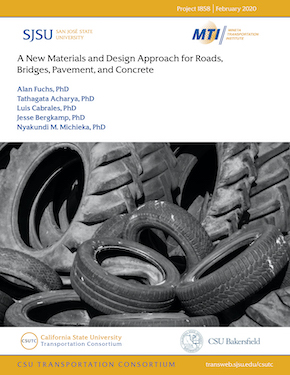- 408-924-7560
- mineta-institute@sjsu.edu
- Donate
A New Materials and Design Approach for Roads, Bridges, Pavement, and Concrete
Increased understanding of demand for transport energy and how to improve road pavement materials would enable decision makers to make environmental, financial, and other positive changes in future planning and design of roads, bridges, and other important transportation structures. This research comprises three studies focused on pavement materials and a fourth study that examines energy demand within the road transportation sector. These studies are as follows:
1. A techno-economic study of ground tire rubber as an asphalt modifier;
2. A computational fluid dynamics analysis comparing the urban heat island effect of two different pavement materials – asphalt and Portland Cement Concrete;
3. A new approach that modifies the surface of ground tire rubber using low-cost chemicals and treatment methods to be used in asphalt applications; and
4. An analysis of road transport energy demand in California and the United States.
The findings of these studies include that 1. GTR is an effective and economically suitable additive for modified asphalt, 2. the suitability of PCC pavements in urban settings should be reexamined, 3. Surface modification of GTR materials can improve compatibilization of particles for the manufacture of asphalt materials, and 4. gasoline sales are generally price inelastic in both the U.S. and California. Ultimately, these four studies improve understanding of road pavement materials and transport energy demand. They lay out important information about the future of the relationship between materials and design in the transportation industry. These findings may be used by engineers, policymakers, and others in the industry to better consider implications of decisions involved in design, creation, and modification of structures using pavement and concrete, including roads, bridges, etc.
ALAN FUCHS
Alan Fuchs is Associate Dean, Research and Faculty Advancement at California State Polytechnic University, Pomona. His expertise is in novel materials and energy. His PhD is from Tufts University. He worked for 12 years in the chemical engineering industry.
TATHAGATA ACHARYA
Tathagata Acharya is an Assistant Professor of Engineering at California State University, Bakersfield. He has a PhD in mechanical engineering from Louisiana State University with a specialization in thermal and fluid sciences. In addition to spending three years in academia, he has spent 4.5 years in the energy industry working in various research engineer roles.
LUIS CABRALES
Luis Cabrales is an Associate Professor of Engineering at California State University, Bakersfield. He has a background in chemical engineering and a PhD with a specialization in Fibers and Biopolymers. His expertise is in polymer materials, surface modification, and water treatment.
JESSE BERGKAMP
Jesse Bergkamp is an Assistant Professor of Chemistry at California State University, Bakersfield. He has a PhD in organic chemistry from Arizona State University with a specialization in renewable energy. He spent two years as a postdoctoral scholar in Bern, Switzerland conducting research on nanomaterials.
NYAKUNDI MICHIEKA
Nyakundi Michieka is an Assistant Professor of Economics at California State University, Bakersfield. His expertise is in the energy sector.
-
Contact Us
San José State University One Washington Square, San Jose, CA 95192 Phone: 408-924-7560 Email: mineta-institute@sjsu.edu






